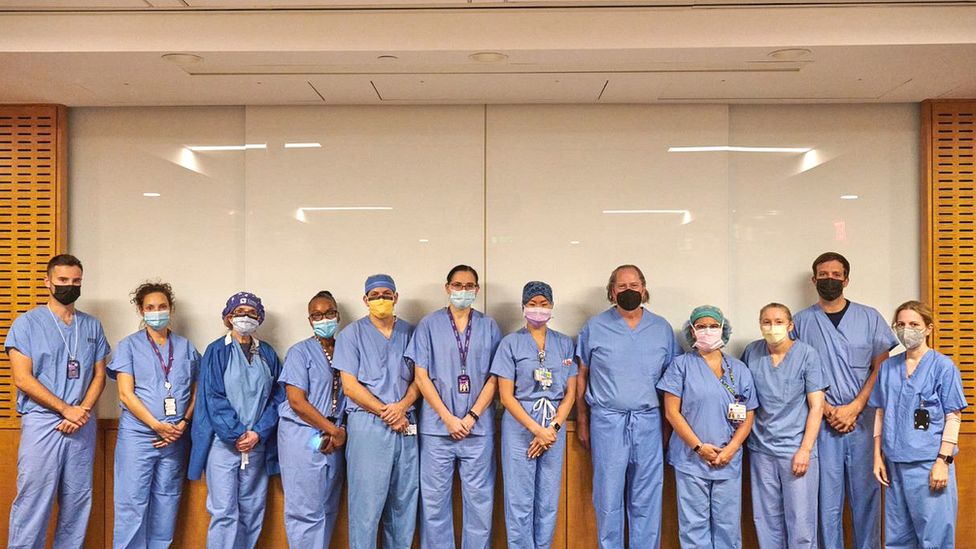Solution for Organ Transplant Shortages
"We observed a kidney that basically functioned like a human kidney transplant, that appeared to be compatible in as much as it did all the things that a normal human kidney would do.""It functioned normally, and did not appear to be undergoing rejection.""The traditional paradigm that someone has to die for someone else to live is never going to keep up.""I certainly understand the concern and what I would say is that currently about 40% of patients who are waiting for a transplant die before they receive one.""We use pigs as a source of food, we use pigs for medicinal uses - for valves, for medication. I think it's not that different."Dr.Robert Montgomery, transplant surgeon, New York University Langone Health medical centre
 |
| The surgery took a couple of hours NYU Langone |
"Animal to human transplantation has been something that we have studied for decades now, and it's really interesting to see this group take that step forward.""Just because we can doesn't mean we should. I think the community at large needs to answer these questions."Dr Maryam Khosravi, kidney and intensive care doctor, National Health Service, U.K."There is still some way to go before transplants of this kind become an everyday reality.""While researchers and clinicians continue to do our best to improve the chances for transplant patients, we still need everyone to make their organ donation decision and let their family know what they want to happen if organ donation becomes a possibility."National Health Service spokesperson, U.K.Another milestone has been achieved in prolonging human life. To the present, complications that result from organ transplants when the body's natural instinct is to reject the presence of a foreign body, was to place an organ recipient on organ-rejection drugs for the rest of their lives. And as with any drug formulation there are risks inherent in their use; for some medications the risks are routine and minimal, for others they can be more serious. In the case of organ-rejection drugs they include side effects such as high blood pressure, weight gain, opportunistic infections and increased cancer risk.
Dr.Montgomery, who led the experiment with the transplanted pig kidney at New York City's NYU Langone Health facility, is himself a transplant recipient, that of a heart transplant. As such, he is deeply involved in organ transplantation as a medical professional and as an individual who suffered grave medical problems leading to this most difficult and fraught of all organ transplants.
Now, for the first time in medical history, a human has received a pig kidney, the surgery resulting in no immediate rejection by the immune system of the recipient as might otherwise have occurred. And the reason was that the kidney came from a pig with altered genes whose tissues no longer contained a molecule known to trigger near-immediate rejection. This procedure signals a major advance in transplantation, one that is expected in time to aid in alleviating a shortage of human transplant organs.
The kidney was transplanted into an individual whose family gave its consent to the experiment to take place just efore she was to be taken off life support in view of her brain-dead condition. She was known to have kidney dysfunction, so as a candidate became a perfect choice. The new kidney was attached for three days to her blood vessels, maintained outside her body, allowing access to it for the researchers involved in the experiment..
Transplant surgeon Dr.Montgomery spoke of test results of the function of the transplanted kidney as that it "looked pretty normal". Functioning so that it made "the amount of urine that you would expect" from a transplanted human kidney, with no evidence of the vigorous, early rejection accompanying the process with unmodified pig kidneys transplanted into non-human primates. Abnormal creatinine levels, indicating poor kidney function, returned to normal following the transplant.
People in need of organ transplants die when no organs to suit their life-or-death needs are available. There is over 100,000 people in the U.S. awaiting organ transplants; of that number over 90,000 await a kidney, according to the United Network for Organ Sharing, where wait times are listed for a kidney at an average of three to five years. The potential for the use of animal organs for transplants has been worked on by researchers for decades. Prevention of immediate rejection by the human body has been a deterrent to their use.
The research team of which Dr.Montgomery was head, theorized that should the pig gene for a carbohydrate triggering rejection -- a glycan sugar molecule called alpha-gal -- be removed, that might solve the rejection problem. United Therapeutics Corp's Revivicor unit developed the genetically altered pig called GalSafe, which was then approved by the U.S. Food and Drug administration for use as food for people with meat allergy, and a potential source of human therapeutics.
The team behind the surgery NYU Langone
Labels: Genetically Altered Pigs Transplanted Kidney, N.Y., NUY Langone Health, Organ Transplants, Research



0 Comments:
Post a Comment
<< Home